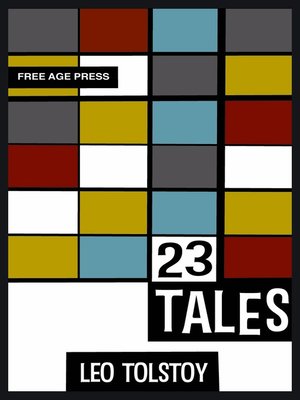Twenty Three Tales
ebook ∣ Classic Tolstoy Stories · Free Age Press Centenary Edition
By Leo Tolstoy

Sign up to save your library
With an OverDrive account, you can save your favorite libraries for at-a-glance information about availability. Find out more about OverDrive accounts.
Find this title in Libby, the library reading app by OverDrive.



Search for a digital library with this title
Title found at these libraries:
| Library Name | Distance |
|---|---|
| Loading... |
In 'Twenty Three tales,' we see Tolstoy's love of the short story, whether for children or adults; and witness the secret of simplicity and transparency of style, so evident in the great Russian writers. The children's stories remind us of Tolstoy's life-long passion for the schooling and education of peasant children. Of the adult stories, some draw on traditional Russian folk tales, breathe the air old peasant wisdom, and take us deep into the land of snow, bears, heartache and vodka. Other stories reflect Tolstoy's political and moral concerns, such as war, alcohol and greed.
'The artist of the future,' wrote Tolstoy, 'will understand that to compose a fairy tale; a little song which will touch; a lullaby or a riddle which will entertain; a jest which will amuse or draw a sketch such as will delight dozens of generations or millions of children and adults, is incomparably more important and more fruitful than to compose a novel, or a symphony, or paint a picture of the kind which diverts some members of the wealthy classes for a short time and is then for ever forgotten.
In his book, 'Twenty Three tales,' we see Tolstoy's love of the short story, whether for children or adults; and witness the secret of simplicity and transparency of style, so evident in the great Russian writers. The children's stories remind us of Tolstoy's life-long passion for the schooling and education of peasant children. Of the adult stories, some draw on traditional Russian folk tales, breathe the air old peasant wisdom, and take us deep into the land of snow, bears, heartache and vodka. Other stories reflect Tolstoy's political and moral concerns, such as war, alcohol and greed.
'The artist of the future,' wrote Tolstoy, 'will understand that to compose a fairy tale; a little song which will touch; a lullaby or a riddle which will entertain; a jest which will amuse or draw a sketch such as will delight dozens of generations or millions of children and adults, is incomparably more important and more fruitful than to compose a novel, or a symphony, or paint a picture of the kind which diverts some members of the wealthy classes for a short time and is then for ever forgotten. The region of this art of the simplest feelings accessible to all is enormous, and it is as yet almost untouched.'
'Work while ye have the light,' is Tolstoy in teaching mode. The opening scene is an aristocratic dinner party, at which all the guests declare themselves dissatisfied with their dissolute and useless lives; but find a thousand different reasons why nothing should change. There follows a moral tale, set in the 1st Century AD, when the new Christian sect was just getting noticed by the prevailing Roman Empire. It tells the story of two school friends, Pamphylius and Julius, who take different paths in life; but whose paths keep crossing. Pamphylius joins the Christians, living poor in community, while Julius acquires status and power. Here Tolstoy gives us his picture of authentic Christianity; and gives Julius a choice.
Simon Parke, author of The One Minute Mystic







